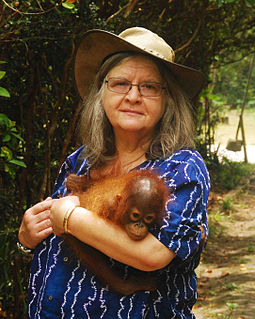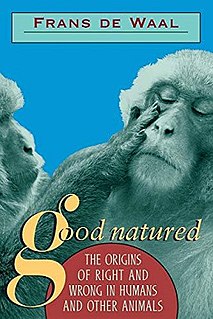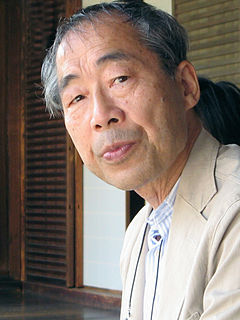
A primate is a eutherian mammal constituting the taxonomic order Primates. Primates arose 85–55 million years ago first from small terrestrial mammals, which adapted to living in the trees of tropical forests: many primate characteristics represent adaptations to life in this challenging environment, including large brains, visual acuity, color vision, a shoulder girdle allowing a large degree of movement in the shoulder joint, and dextrous hands. Primates range in size from Madame Berthe's mouse lemur, which weighs 30 g (1 oz), to the eastern gorilla, weighing over 200 kg (440 lb). There are 190–448 species of living primates, depending on which classification is used. New primate species continue to be discovered: over 25 species were described in the 2000s, and 11 since 2010.

The bonobo, also historically called the pygmy chimpanzee and less often, the dwarf or gracile chimpanzee, is an endangered great ape and one of the two species making up the genus Pan; the other being the common chimpanzee. Although bonobos are not a subspecies of chimpanzee, but rather a distinct species in their own right, both species are sometimes referred to collectively using the generalized term chimpanzees, or chimps. Taxonomically, the members of the chimpanzee/bonobo subtribe Panina are collectively termed panins.

In primatology, machiavellian intelligence is the capacity of an organism to be in a successful political engagement with social groups. The first introduction of this concept came from Frans de Waal's book Chimpanzee Politics (1982), which described social maneuvering while explicitly quoting Machiavelli.

Apes are a branch of Old World tailless simians native to Africa and Southeast Asia. They are the sister group of the Old World monkeys, together forming the catarrhine clade. They are distinguished from other primates by a wider degree of freedom of motion at the shoulder joint as evolved by the influence of brachiation. In traditional and non-scientific use, the term "ape" excludes humans, and can include tailless primates taxonomically considered monkeys, and is thus not equivalent to the scientific taxon Hominoidea. There are two extant branches of the superfamily Hominoidea: the gibbons, or lesser apes; and the hominids, or great apes.
Binti Jua is a female western lowland gorilla in the Brookfield Zoo, in Brookfield, Illinois, outside of Chicago, US. She was involved in an incident in 1996, in which she tended to a three-year-old boy who had fallen into her enclosure.

Franciscus Bernardus Maria "Frans" de Waal is a Dutch primatologist and ethologist. He is the Charles Howard Candler Professor of Primate Behavior in the Department of Psychology at Emory University in Atlanta, Georgia, director of the Living Links Center at the Yerkes National Primate Research Center at Emory, and author of numerous books including Chimpanzee Politics (1982) and Our Inner Ape (2005). His research centers on primate social behavior, including conflict resolution, cooperation, inequity aversion, and food-sharing. He is a member of the United States National Academy of Sciences and the Royal Netherlands Academy of Arts and Sciences.

The simians, anthropoids or higher primates are an infraorder of primates containing the parvorders Platyrrhini and Catarrhini, the latter of which consists of the superfamilies Cercopithecoidea and Hominoidea.

Birutė Marija Filomena Galdikas or Birutė Mary Galdikas, OC, is a Lithuanian-Canadian anthropologist, primatologist, conservationist, ethologist, and author. She is a professor at Simon Fraser University. In the field of primatology, Galdikas is recognized as a leading authority on orangutans. Prior to her field study of orangutans, scientists knew little about the species.
Neontology is a part of biology that, in contrast to paleontology, deals with living organisms. It is the study of extant taxa : taxa with members still alive, as opposed to (all) being extinct. For example:

The Third Chimpanzee: The Evolution and Future of the Human Animal is a 1991 book by academic and popular science author Jared Diamond, in which the author explores concepts relating to the animal origins of human behavior. The book follows a series of articles published by Diamond, a physiologist, examining the evidence and its interpretation in earlier treatments of the related species, including cultural characteristics or features often regarded as particularly unique to humans. The book was released in the United Kingdom in 1991 by Radius under the title The Rise and Fall of the Third Chimpanzee: How Our Animal Heritage Affects the Way We Live and in the United States in 1992 by Harper Collins under the title The Third Chimpanzee: The Evolution and Future of the Human Animal. In 2014, Diamond published an adapted version for young people with Seven Stories Press titled, The Third Chimpanzee for Young People.

Monkey is a common name that may refer to certain groups or species of simian mammals of infraorder Simiiformes. The term is applied descriptively to groups of primates, such as families of New World monkeys and Old World monkeys. Many monkey species are tree-dwelling (arboreal), although there are species that live primarily on the ground, such as baboons. Most species are mainly active during the day (diurnal). Monkeys are generally considered to be intelligent, especially the Old World monkeys of Catarrhini.

Sue Savage-Rumbaugh is a psychologist and primatologist most known for her work with two bonobos, Kanzi and Panbanisha, investigating their linguistic and cognitive abilities using lexigrams and computer-based keyboards. Originally based at Georgia State University's Language Research Center in Atlanta, Georgia, she worked at the Iowa Primate Learning Sanctuary in Des Moines, Iowa from 2006 until her departure in November 2013. She currently sits on the Board of Directors of Bonobo Hope.

Good Natured is a book by primatologist Frans de Waal on animal behavior and the evolution of ethics.
Primate cognition is the study of the intellectual and behavioral skills of non-human primates, particularly in the fields of psychology, behavioral biology, primatology, and anthropology.
Veneer theory is a term coined by Dutch primatologist Frans de Waal to label the Hobbesian view of human morality that he criticizes throughout his work. Although he criticizes this view in earlier works, the term in this form is introduced in his 2005 book "Our Inner Ape", denoting a concept that he rejects, namely that human morality is "a cultural overlay, a thin veneer hiding an otherwise selfish and brutish nature". The idea of the veneer theory goes back to Thomas Henry Huxley and has more recently been advocated by biologists like George C. Williams.

Josep Call is a Spanish comparative psychologist specializing in primate cognition.
Eduard Paul Tratz was an Austrian zoologist.
Neuropolitics is a science which investigates the interplay between the brain and politics. It combines work from a variety of scientific fields which includes neuroscience, political science, psychology, behavioral genetics, primatology, and ethology. Often, neuropolitics research borrow methods from cognitive neuroscience to investigate classic questions from political science such as how people make political decisions, form political / ideological attitudes, evaluate political candidates, and interact in political coalitions. However, another line of research considers the role that evolving political competition has had on the development of the brain in humans and other species. The research in neuropolitics often intersects with work in genopolitics, political psychology, political physiology, sociobiology, neuroeconomics, and neurolaw.

Toshisada Nishida was a Japanese primatologist who established one of the first long term chimpanzee field research sites, in 1965, and was the first to discover that, instead of forming nuclear family-like arrangements, chimpanzees live a communal life with territorial boundaries. He also laid the basis for the new field of zoopharmacognosy on discovering the potentially medicinal use of plants by wild chimpanzees. He was full professor in the Zoology Department of Kyoto University. Toshisada Nishida received the Leakey Prize for his accomplishments in human evolutionary science.
David Andrew Whiten, known as Andrew Whiten is a British zoologist and psychologist, Professor of Evolutionary and Developmental Psychology, and Professor Wardlaw Emeritus at University of St Andrews in Scotland. He is known for his research in social cognition, specifically on social learning, tradition and the evolution of culture, social Machiavellian intelligence, autism and imitation, as well as the behavioral ecology of sociality. In 1996, Whiten and his colleagues invented an artificial fruit that allowed to study learning in apes and humans.













